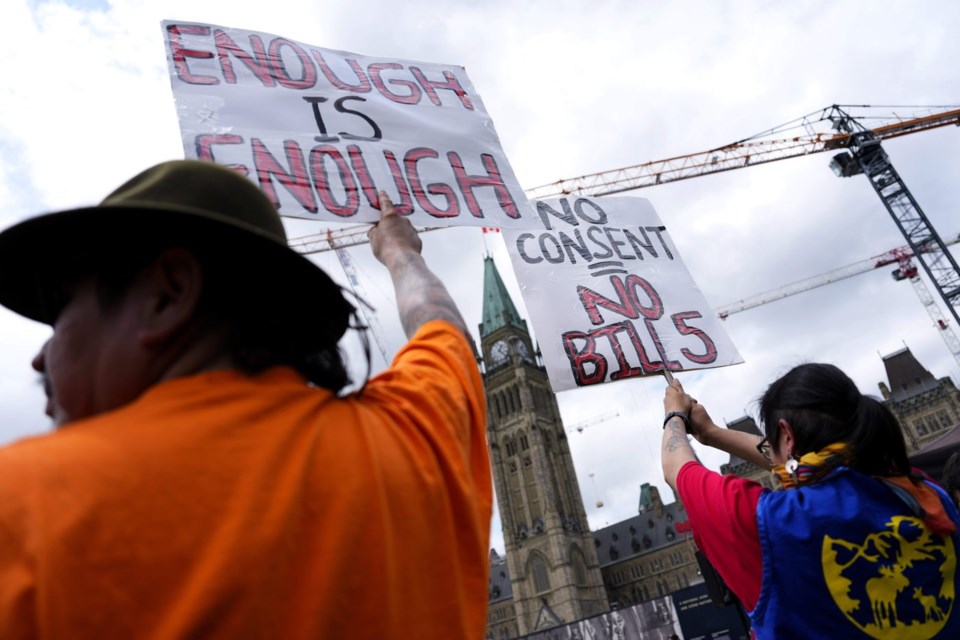OTTAWA — A new think tank report is questioning how the federal and provincial governments' sprint to build major infrastructure projects might affect Indigenous Peoples' rights — and warns that it could end up pitting Indigenous communities against each other.
The report by the Yellowhead Institute, "Buried Burdens," takes a look at major projects through a case study of the Prince Rupert Gas Transmission Project and the Ksi Lisims facility in B.C., which are expected to transport millions of tonnes of gas per year.
Owned in part by the Nisga'a Nation, the project has seen staunch opposition from other First Nations communities that did not approve or consent to it.
The Yellowhead report, released this week, comes amid a countrywide push to rapidly launch major projects, including pipelines, to shore up the economy against U.S. President Donald Trump's trade war.
The recently passed One Canadian Economy Act gives Ottawa the power to fast-track projects it deems to be in the national interest by sidestepping environmental protections and other legislation.
Governments have been encouraging First Nations leaders to support such projects through loan guarantees and promises of financial incentives. But many First Nations leaders fear their ways of life could be irreparably harmed if governments evade environmental standards.
"Right now, the narrative is full speed ahead on resource development," said Hayden King, a member of Beausoliel First Nation who serves as Yellowhead's executive director.
"Increasingly, that includes Indigenous partners, but there's not a lot of discussion on the dynamics of investing in projects like these, and there's a risk that has to be considered …
"First Nations are not necessarily the ones merely impacted by these developments, but they're being encouraged to invest in these projects, to be partners in these projects and grant social licence to enable these projects."
Some provinces have enacted laws similar to the One Canadian Economy Act, including Bill 5 in Ontario, now the subject of a court challenge by nine First Nations.
And in B.C., Premier David Eby's government passed Bills 14 and 15 — pieces of legislation meant to ramp up energy and infrastructure development that have come under fire from First Nations.
Prime Minister Mark Carney has frequently pointed to Indigenous participation in major projects as a means to ensure their success and prevent delays. He has pointed to the $10 billion Indigenous Loan Guarantee Program as proof of Ottawa's commitment to ensuring Indigenous communities have a meaningful stake.
The report challenges that argument altogether, calling it an "industry-driven narrative."
"While there are potential benefits from participating in equity ownership when compared to shorter-term impact benefit agreements and service contracts, there are also greater risks," the report says.
"This particular philosophy of 'economic reconciliation' imagines Indigenous communities regaining control of their economies, aiming for self-sufficiency, sustainability, and self-determination. This is an industry-driven narrative that presents resource extraction as the singular pathway to achieve these ends."
That narrative, the report says, could also cause rifts between Indigenous communities that support specific projects and those that do not.
"While uncomfortable, conflict and disagreement are part of Nation-to-Nation relationships — and always have been. However, it is equally important to recognize that in true Nation-to-Nation relationships, the self-determining rights of one Nation cannot supersede the inherent rights of another," the report says.
King said potential conflicts between pro-development communities and those more hesitant lends itself to conversations about the kinds of development that align with their values.
But that conversation is also about rights, King said, and how courts will strike a balance among First Nations who don't see eye-to-eye on project proposals.
"Let's not have the courts decide the answers to those questions, but let's actually work through diplomacy and figure those out on our own terms, using our own Indigenous law," he said.
King said that discussion should "feed back into the conversation about what kind of economy … we want," pointing to the pre-contact economies that once sustained Indigenous Peoples.
"We had these economies, and still do to a degree. So what would it look like to reimagine those, and rearticulate them in the face of the narrative that we only have one option, which is resource development?" he said.
This report by The Canadian Press was first published July 23, 2025.
Alessia Passafiume, The Canadian Press



